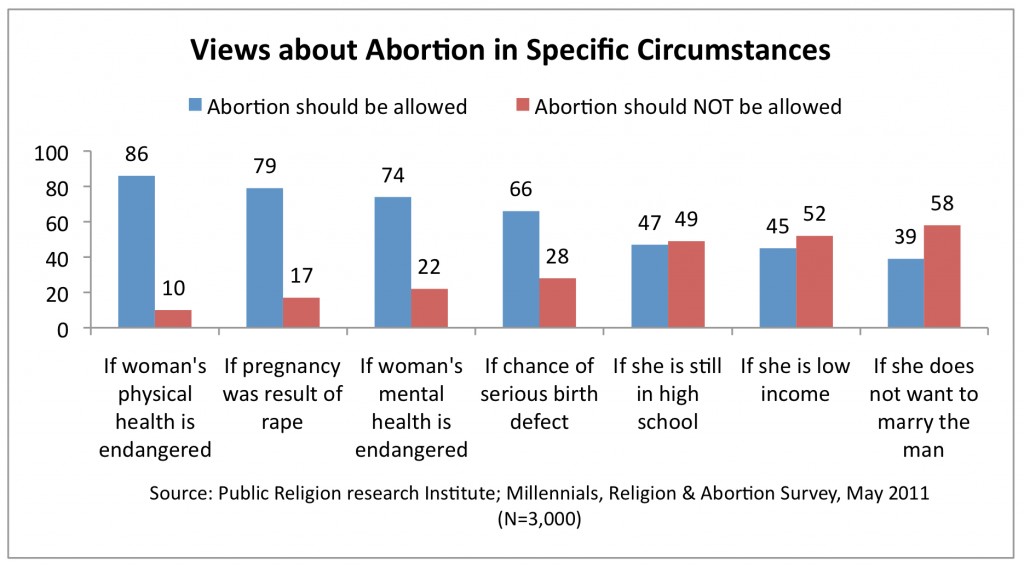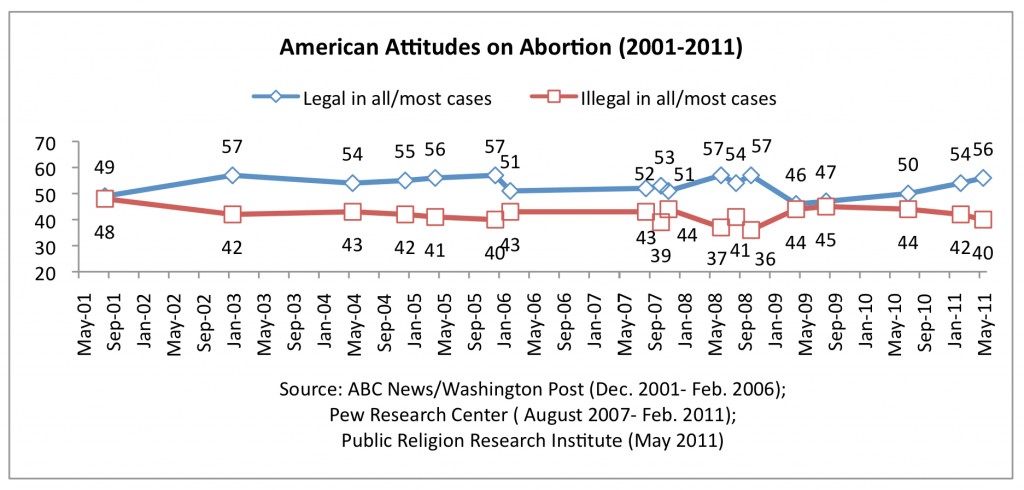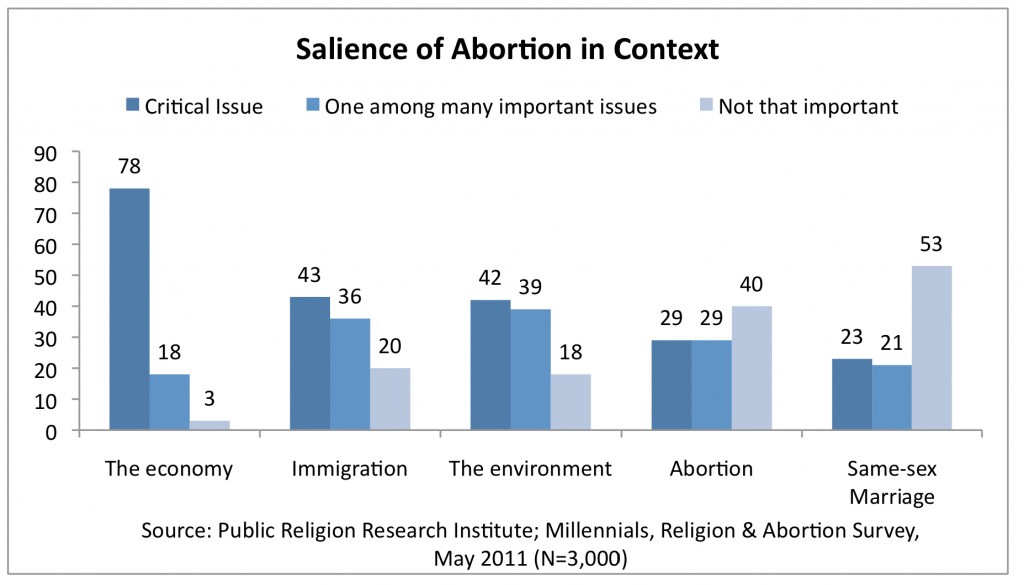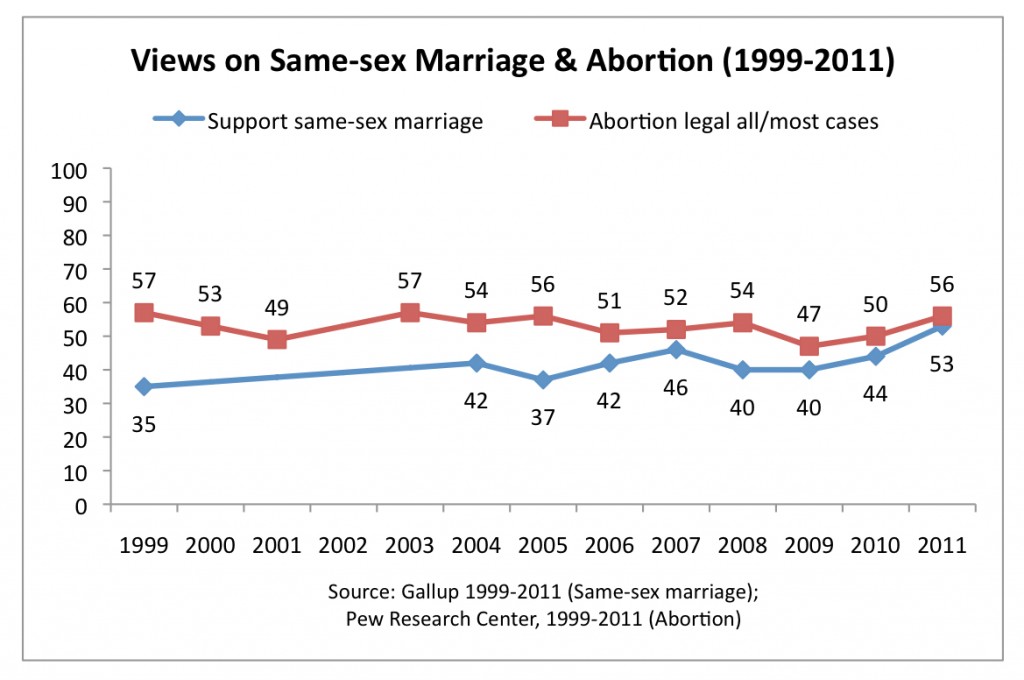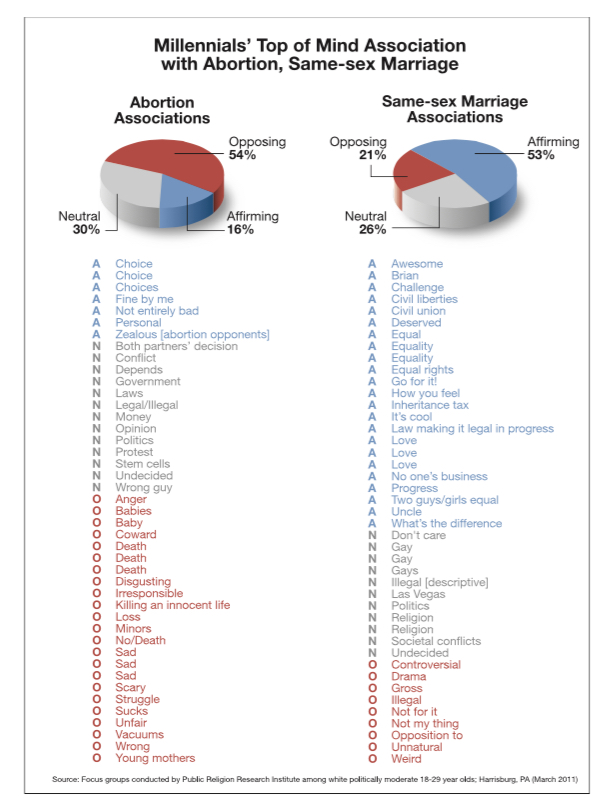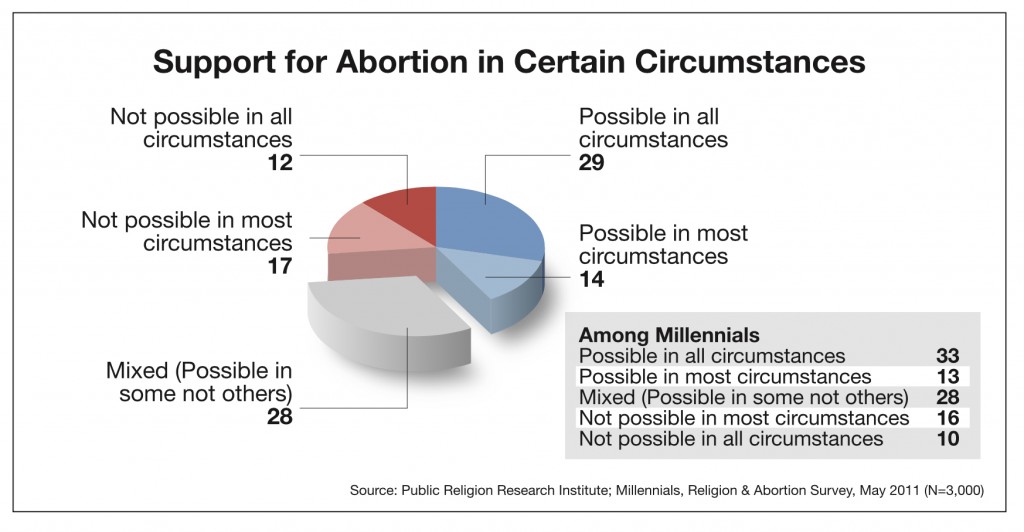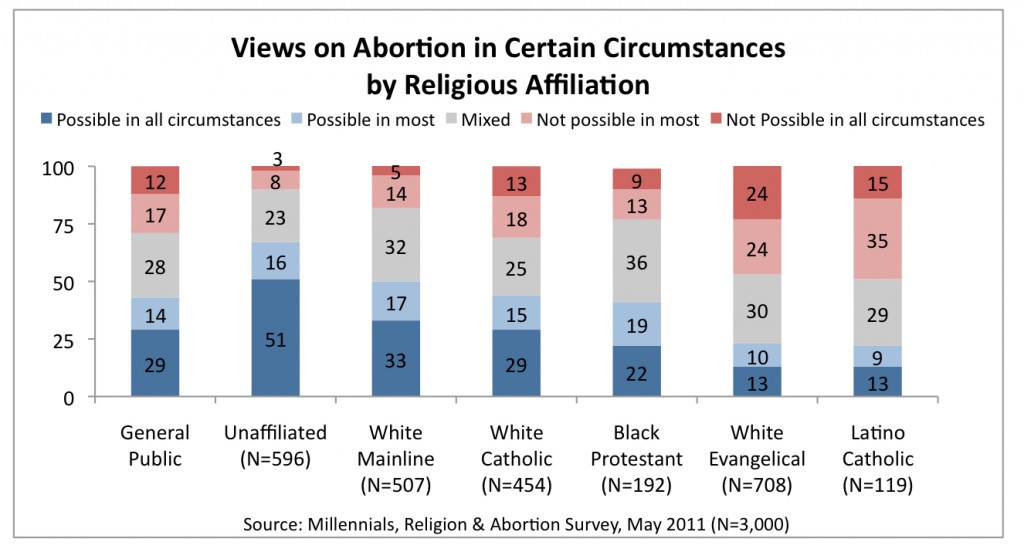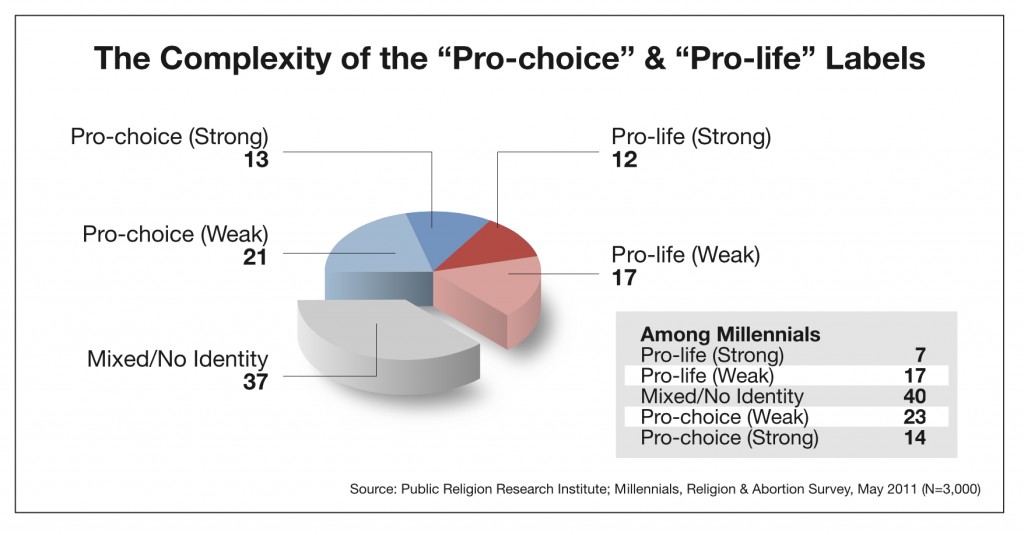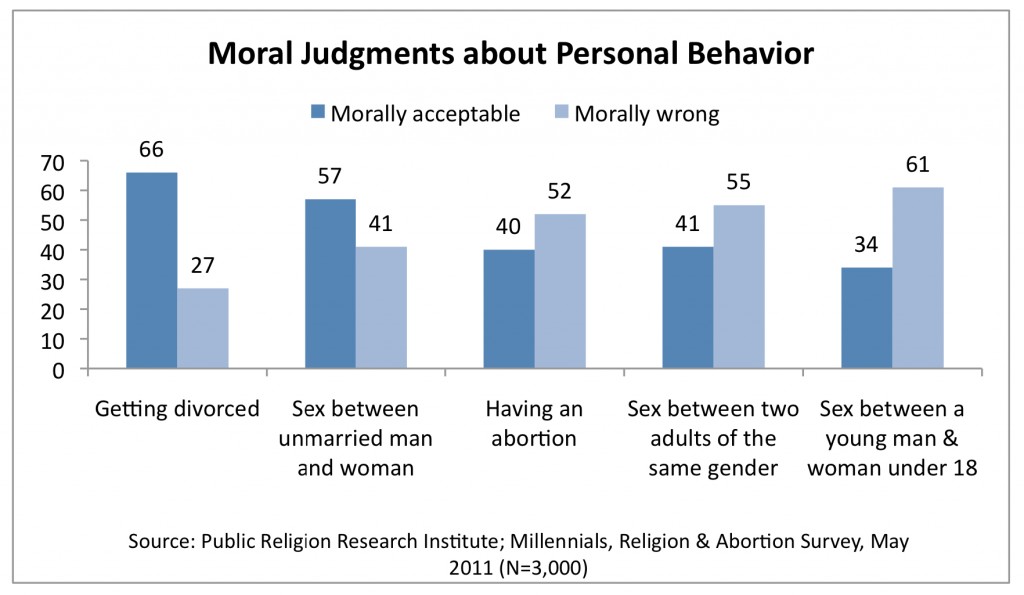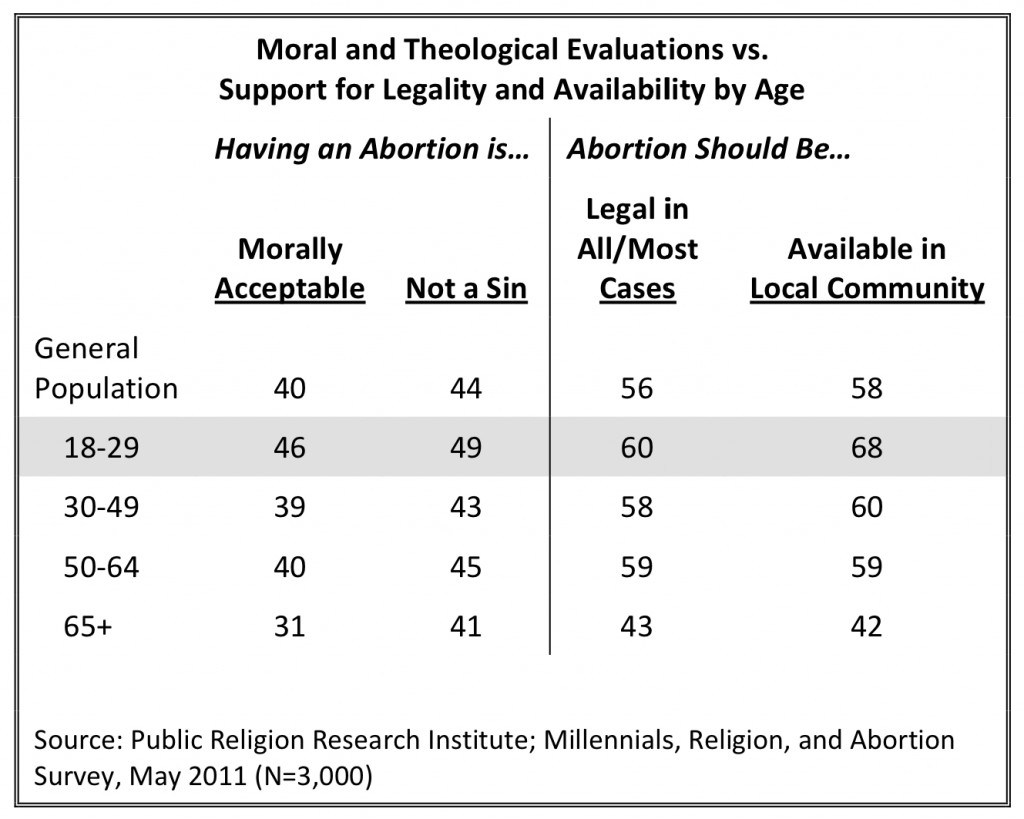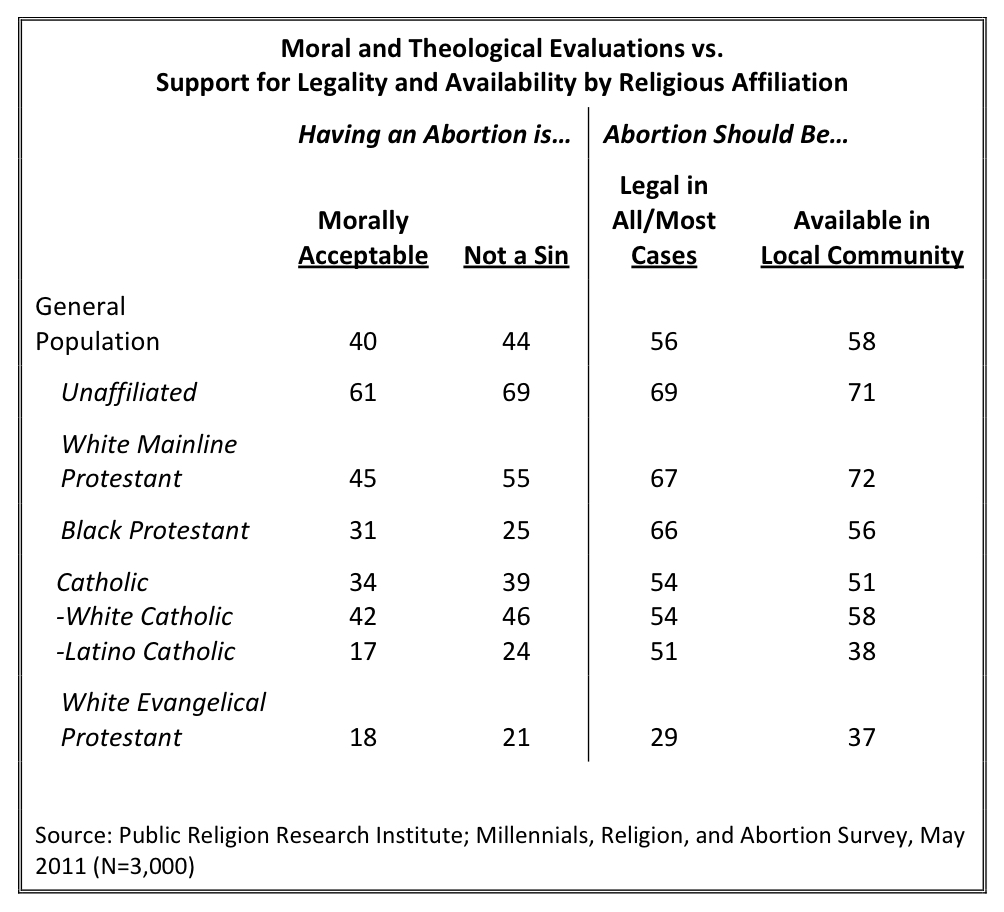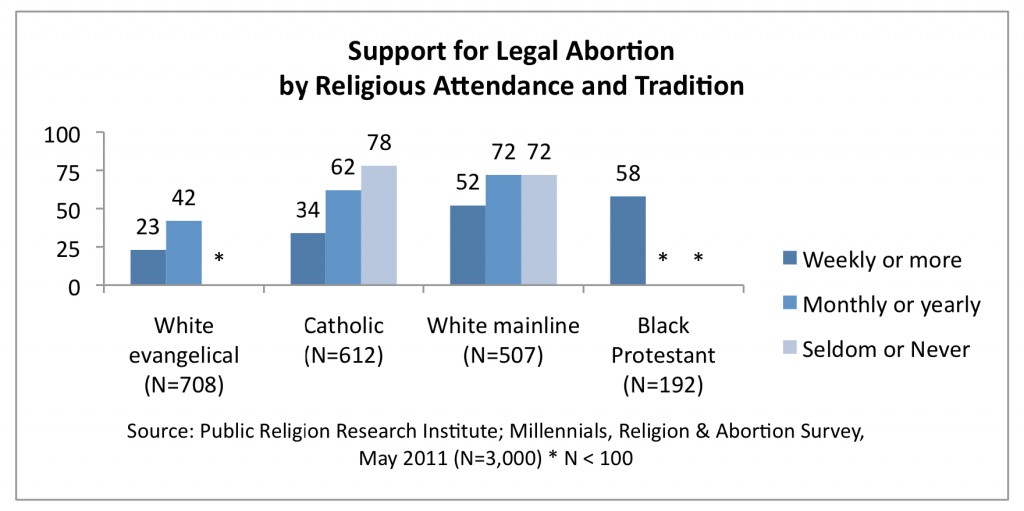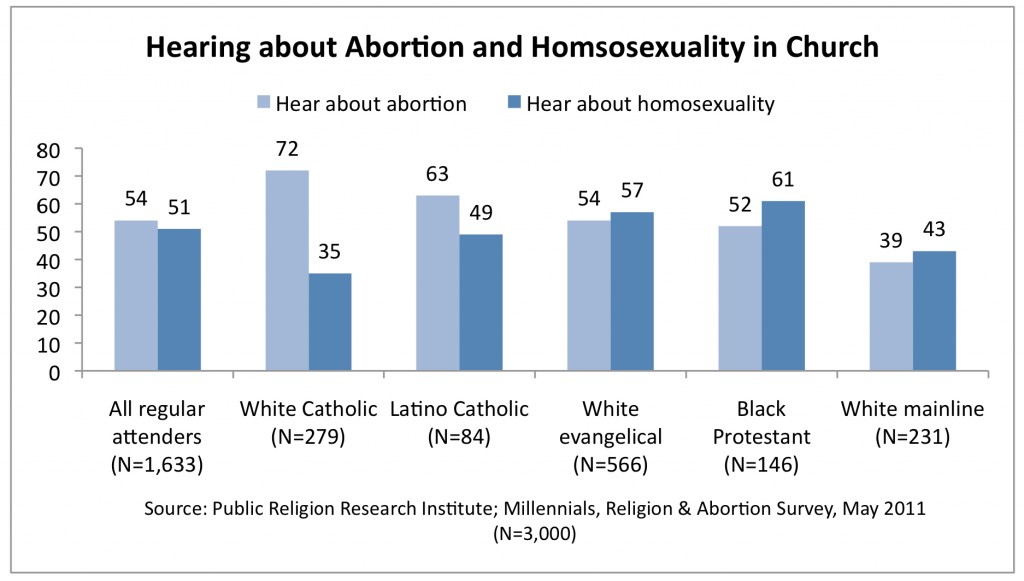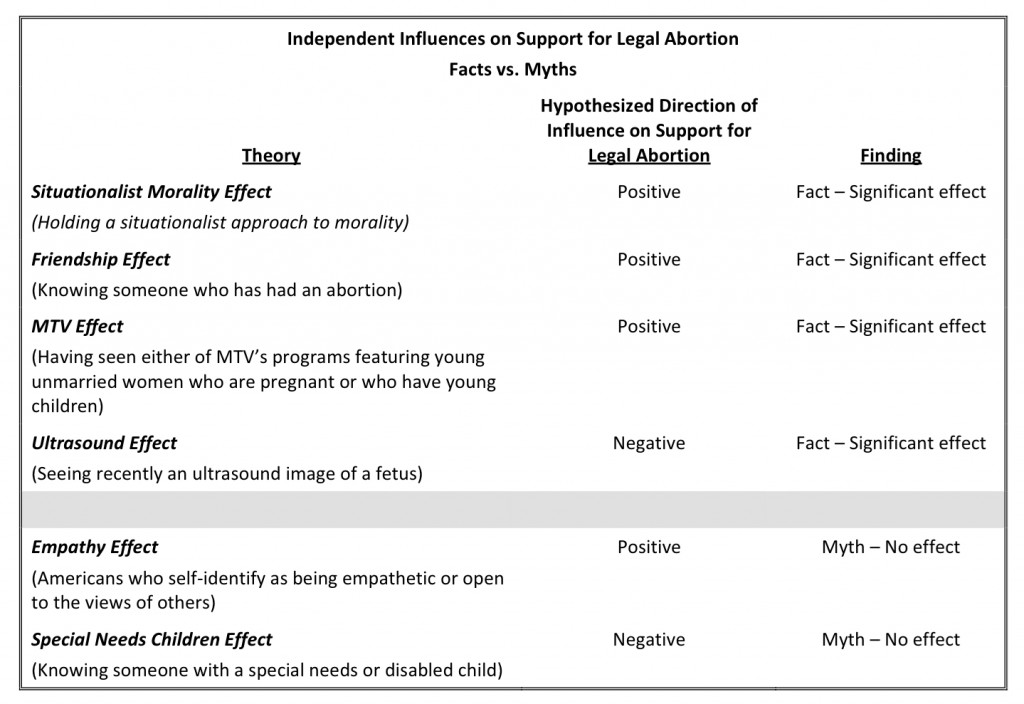Executive Summary
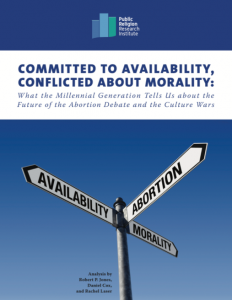 A solid majority of Americans say abortion should be legal in all (19%) or most (37%) cases, compared to 4-in-10 who say it should be illegal in all (14%) or most (26%) cases.
A solid majority of Americans say abortion should be legal in all (19%) or most (37%) cases, compared to 4-in-10 who say it should be illegal in all (14%) or most (26%) cases.
With the exception of white evangelical Protestants, majorities of all major religious groups say abortion should be legal in all or most cases. A majority of Americans across the political spectrum say it is more socially acceptable today to be “pro-choice” rather than “pro-life.”
Nearly 6-in-10 (58%) Americans say that at least some health care professionals in their communities should provide legal abortions. With the exception of white evangelical Protestants and Latino Catholics, majorities of all major religious groups agree that at least some health care professionals in their community should provide legal abortions. Americans who live in large metropolitan areas are much more likely than those who live in rural communities to say legal abortion services should be available in their community (67% vs. 39% respectively).
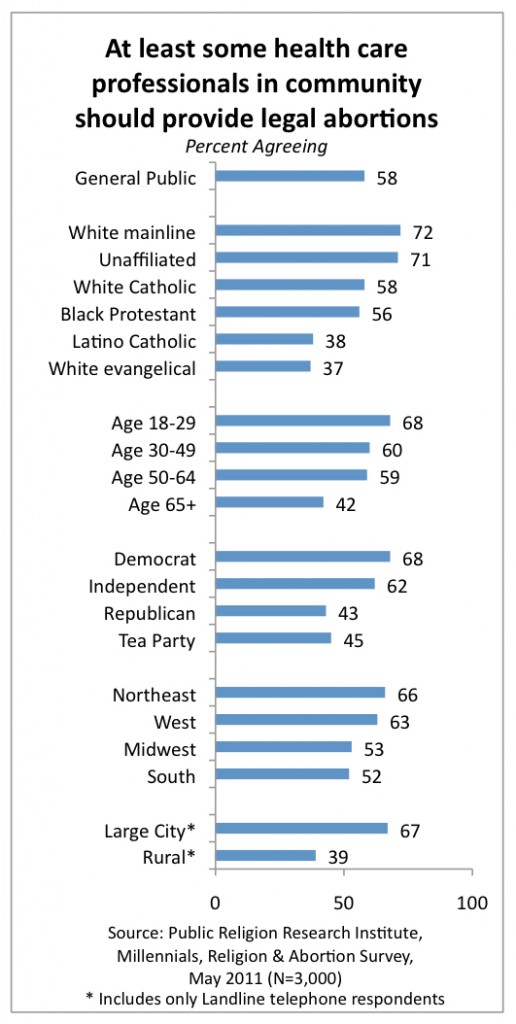 The binary “pro-choice”/“pro-life” labels do not reflect the complexity of Americans’ views on abortion. Seven-in-ten Americans say the term “pro-choice” describes them somewhat or very well, and nearly two-thirds simultaneously say the term “pro-life” describes them somewhat or very well. This overlapping identity is present in virtually every demographic group.
The binary “pro-choice”/“pro-life” labels do not reflect the complexity of Americans’ views on abortion. Seven-in-ten Americans say the term “pro-choice” describes them somewhat or very well, and nearly two-thirds simultaneously say the term “pro-life” describes them somewhat or very well. This overlapping identity is present in virtually every demographic group.
The decoupling of attitudes on abortion and same-sex marriage suggests that these topics, which served in the past as the heart of the “values” agenda, are no longer necessarily linked in the minds of Americans. Roughly the same percentage of Americans said abortion should be legal in all or most cases in 1999 (57%) as say this today (56%). In contrast, the percentage of Americans who said marriages between same-sex couples should be recognized by the law as valid has grown 18 points over this same period, from 35% in 1999 to 53% in 2011.
Millennials are less supportive of legal abortion than their demographic profile would suggest.
- Millennials generally have traits associated with higher levels of support for the legality of abortion: they are more educated, more liberal, and more likely to be religiously unaffiliated.
- Millennials exemplify the decoupling of attitudes on legal abortion and same-sex marriage. They are much more likely than the general public to favor same-sex marriage, but they are not significantly more likely than the general public to support the legality of abortion (60% vs. 56% in the general public).
- Millennials have largely positive top of mind associations with same-sex marriage but have largely negative top of mind associations with abortion.
- Millennials are conflicted about the morality of abortion, but most say same gender sexual relationships are morally acceptable. Nearly 6-in-10 (57%) Millennials say sex between two adults of the same gender is morally acceptable, compared to only 46% who say having an abortion is morally acceptable.
- Unlike all other age groups, Millennials register different levels of support for the availability and legality of abortion. On the one hand, Millennials are strongly committed to the availability of abortion and are significantly more likely than the general public to say that at least some health care professionals in their community should provide legal abortions (68% vs. 58% respectively). But they are no more likely than the general public to say that abortion should be legal in all or most cases. These findings suggest general measures of legality may not fully capture support for legal abortion among Millennials.
On the issue of abortion, Americans hold complex and sometimes contradictory views, and grasping this complexity is critical for understanding the dynamics of the debate.
- Approximately 3-in-10 Americans hold decidedly mixed views about the circumstances in which having an abortion should be possible. When measured on a composite scale of support for abortion in five specific circumstances, 43% say abortion should be possible in most or all of these circumstances, 29% say abortion should not be possible in most or all of these circumstances, and 28% hold decidedly mixed views.
- Majorities of Americans simultaneously say abortion is morally wrong (52%) and that it should be legal in all or most cases (56%).
The study identified and tested a number of hypotheses about independent influences on attitudes about the legality of abortion. The following factors are independent predictors of support for the legality of abortion, even when controlling for other demographic characteristics:
- Having a situationalist rather than a principle-based approach to morality has a positive impact on support for the legality of abortion.
- Knowing someone who has had an abortion has a positive impact on support for the legality of abortion.
- Having seen MTV’s reality shows about unmarried pregnant teenagers has a positive impact on support for the legality of abortion.
- Recently seeing an ultrasound image of a fetus has a negative impact on support for the legality of abortion.
Among Americans who attend church at least once or twice a month, majorities report hearing their clergy talk about the issue of abortion (54%) or homosexuality (51%) in church. Catholics are significantly more likely than Protestants to hear about abortion in church.
More than 7-in-10 (72%) religious Americans believe it is possible to disagree with the teachings of their religion on the issue of abortion and still be considered a person of good standing in their faith.
- A majority of all major religious groups, including Catholics and white evangelical Protestants agree with this statement.
I. The Peculiar Profile of Millennials on Abortion
The Millennial Generation, also known as Generation Y, describes the generational cohort that follows Generation X. This generation includes Americans that were born after 1980 and came of age around the Millennium. For analytical purposes in this report, we will limit the definition of Millennials to Americans age 18 to 29. Millennials are different from older generations in a number of ways: they are more racially and ethnically diverse, less religious by almost any measure, and will likely become the most educated generation in American history. In their comprehensive report on Millennials, the Pew Research Center described Millennials as “confident, self-expressive, liberal, upbeat, and open to change.” One of the most politically important ways that Millennials differ from other cohorts is their attitudes about gender roles and sexual morality. Millennials strongly support gender equality and rights for gay and lesbian people and generally have more permissive attitudes towards sexuality issues.
However, by traditional measures, younger Americans are no more supportive of abortion rights than the general population, despite having demographic characteristics (e.g., less religious) and attitudes on related issues (e.g., gender equality) that are positively correlated with support for legal abortion. The purpose of this study is to shed some light on this apparent paradox and to explore what role religion and values play in younger Americans’ attitudes towards reproductive issues.
The Millennials, Religion, and Abortion Survey is the largest national public opinion survey ever conducted on abortion and the influence of religion and moral values on the issue. Because of its large sample size (N=3,000 interviews), it allows us to paint a portrait of generational, religious, and ethnic differences that has not been previously possible.
II. American Attitudes on Abortion
Trends in Abortion Attitudes (2001-2011)
Over the last decade, a majority or plurality of Americans have said abortion should be legal in all or most cases, although there has been some volatility. Specifically, throughout most of the decade, solid majorities usually hovering around the mid-50’s reported that abortion should be legal in all or most cases, compared to roughly 4-in-10 who said it should be illegal in all or most cases. In August 2001, and again in 2009, the country was nearly divided, but numbers soon returned to their previous pattern. Our most recent data reflects the dominant pattern: a solid majority of Americans say abortion should be legal in all (19%) or most (37%) cases, and 4-in-10 say it should be illegal in all (14%) or most (26%) cases.
The most polarized positions—views that abortion should be legal or illegal in all cases—have consistently been a minority opinion. Currently, roughly 1-in-5 (19%) Americans report that abortion should be legal in all cases, and 14% report that it should be illegal in all cases. Over the last ten years, the percentage of Americans who say abortion should be legal in all cases has never risen above 21%, and the percentage who say it should be illegal in all cases has never risen above 17%.
Views on Abortion by Demographic Subgroups
Views on abortion vary significantly by age, religion, race, education, political affiliation, and geographic region. However, there are no significant gender differences in views about the legality of abortion. Attitudes among the Millennial generation (ages 18 to 29) do not significantly differ from attitudes in the general population about the legality of abortion. Six-in-ten Millennials believe that abortion should be legal in all (22%) or most (38%) cases, compared to approximately 4-in-10 who say abortion should be illegal in all (13%) or most (25%) cases. Americans ages 65 and older are the only age group that differs significantly from the general public. Among this older age cohort, only about 4-in-10 say abortion should be legal in all (14%) or most (29%) cases, compared to half who say it should be illegal in all (17%) or most (33%) cases.
With the exception of white evangelical Protestants, majorities of all other major religious groups favor legalized abortion. At least two-thirds of religiously unaffiliated Americans (69%), white mainline Protestants (67%), and black Protestants (66%) say abortion should be legal in all or most cases. A majority (54%) of all Catholics say abortion should be legal in all or most cases, including 51% of Latino Catholics. Among white evangelical Protestants, however, less than 3-in-10 (29%) say abortion should be legal in all or most cases, compared to two-thirds (67%) who say it should be illegal in all or most cases.
There are significant differences by race and ethnicity. Nearly two-thirds (64%) of African Americans believe abortion should be legal in all or most cases. A solid majority (56%) of non-Hispanic whites say abortion should be legal in all or most cases, mirroring the general population. Latinos, in contrast, are evenly divided on the issue, with 47% saying abortion should be legal in all or most cases and 49% saying it should illegal in all or most cases.
Higher educational attainment levels are associated with more supportive views of legal abortion. Among Americans with a post-graduate education, nearly 7-in-10 (68%) say abortion should be legal in all or most cases. In contrast, Americans with a high school education or less are nearly evenly divided on the issue, with 50% saying abortion should be legal in all or most cases and 46% saying it should be illegal in all or most cases.
Democrats are approximately 30 points more likely to say abortion should be legal than Republicans. Seven-in-ten Democrats say abortion should be legal in all or most cases. Among Republicans and Americans who identify with the Tea Party movement, roughly 4-in-10 say abortion should be legal in all or most cases (38% and 41% respectively). Solid majorities of Republicans and Americans who identify with the Tea Party movement say abortion should be illegal in all or most cases (60% and 55% respectively). Political independents closely mirror the general population.
Americans who live in more urban areas or who live in the Northeast or West are more likely to support legalized abortion than those who live in rural areas or in the South and Midwest. (1) Solid majorities of Americans in the Northeast and West say abortion should be legal in all or most cases (66% and 60% respectively). Americans who live in the South or Midwest are divided, with 51% of each region supporting legal abortion in all or most cases. Sixty-three percent of Americans who live in urban areas believe abortion should be legal in all or most cases, while Americans who live in rural communities are divided, with 45% saying abortion should be legal in all or most cases and half (50%) saying it should be illegal in all or most cases.
Salience of Abortion
Nearly 3-in-10 (29%) Americans say abortion is a critical issue facing the country today; an equal number (29%) say that it is one among many important issues; and 4-in-10 say it is not that important compared to other issues. In comparison, close to 8-in-10 (78%) Americans report that the economy is a critical issue, and more than 4-in-10 Americans say that immigration (43%) and the environment (42%) are critical issues. Fewer than 1-in-4 (23%) report that same-sex marriage is a critical issue; same-sex marriage is the only issue about which a majority (53%) say it is not that important compared to other issues.
Generally speaking, there are only minor variations in priorities among demographic groups, and most subgroups rank abortion fourth out of five issues, with same-sex marriage generally ranking fifth. Three major exceptions to this pattern are white evangelical Protestants, Republicans, and those who identify with the Tea Party. Members of these three subgroups rank abortion third behind the economy and immigration and rank the environment last.
There are significant differences in the salience of abortion between those who believe abortion should be legal and those who believe it should be illegal. Those who oppose legal abortion are more than three times as likely as those who support legal abortion to say it is a critical issue. Among those who say abortion should be illegal in all cases, nearly two-thirds (65%) say that abortion is a critical issue. In contrast, among those who say abortion should be legal in all cases, only 19% say it is a critical issue.
III. Decoupling the “Values” Agenda: Abortion and Same-sex Marriage
In recent election cycles the so-called “values voter” agenda has often been distilled to abortion and same-sex marriage. Yet these two controversial topics are no longer necessarily linked in the minds of Americans. The gap is particularly notable among the Millennial generation, who support rights for gay and lesbian Americans at rates much higher than their parents but whose generally supportive views on the legality of abortion do not deviate significantly from their parents or the general public.
Differing Trends
Over the last decade, the pattern of support for legalized abortion and same-sex marriage have been dramatically different. As we noted above, despite some modest volatility, support for legalized abortion has been generally stable during this period. Roughly the same percentage of Americans said abortion should be legal in all or most cases in 1999 (57%) as say this today (56%). On the issue of same-sex marriage, in contrast, there has been a dramatic shift in opinion, especially over the last decade. In 1999, only 35% of the public said marriages between same-sex couples should be recognized by the law as valid. In 2011, a majority (53%) say same-sex marriage should be recognized by the law as valid, an 18-point increase.
Generational Differences
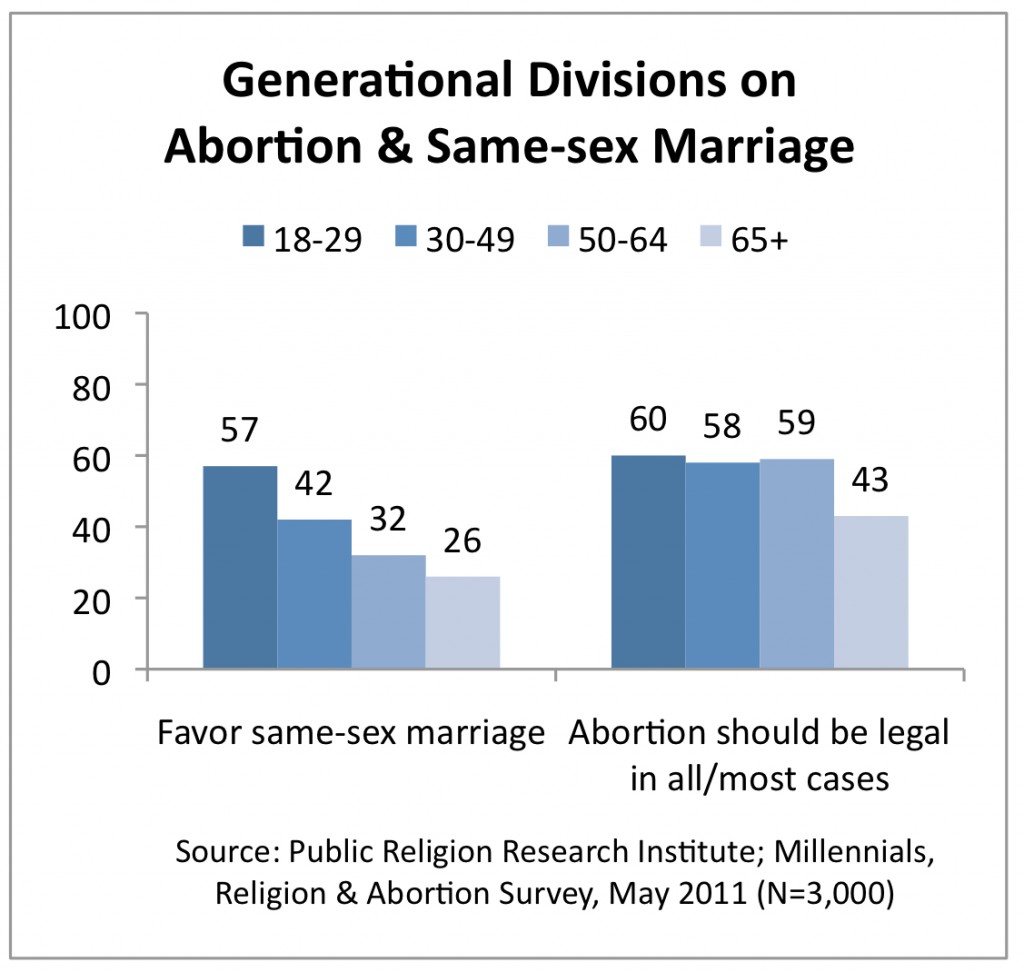 The pattern of support on each of these issues by age also shows remarkable differences between the two issues. There is no significant difference between the views of Millennials and the general public on the issue of abortion. Among age cohorts, only seniors have a significantly different profile. Nearly equal numbers of Millennials (60%), Americans age 30-49 (58%) and Americans age 50-64 (59%) say abortion should be legal in all or most cases, compared to just 43% of Americans age 65 and over.
The pattern of support on each of these issues by age also shows remarkable differences between the two issues. There is no significant difference between the views of Millennials and the general public on the issue of abortion. Among age cohorts, only seniors have a significantly different profile. Nearly equal numbers of Millennials (60%), Americans age 30-49 (58%) and Americans age 50-64 (59%) say abortion should be legal in all or most cases, compared to just 43% of Americans age 65 and over.
The generational divide on the issue of same-sex marriage, in contrast, is nearly linear and dramatic. (2) Among Millennials, nearly 6-in-10 (57%) say gay and lesbian couples should be allowed to marry, and an additional 19% say they should be allowed to form civil unions. Among 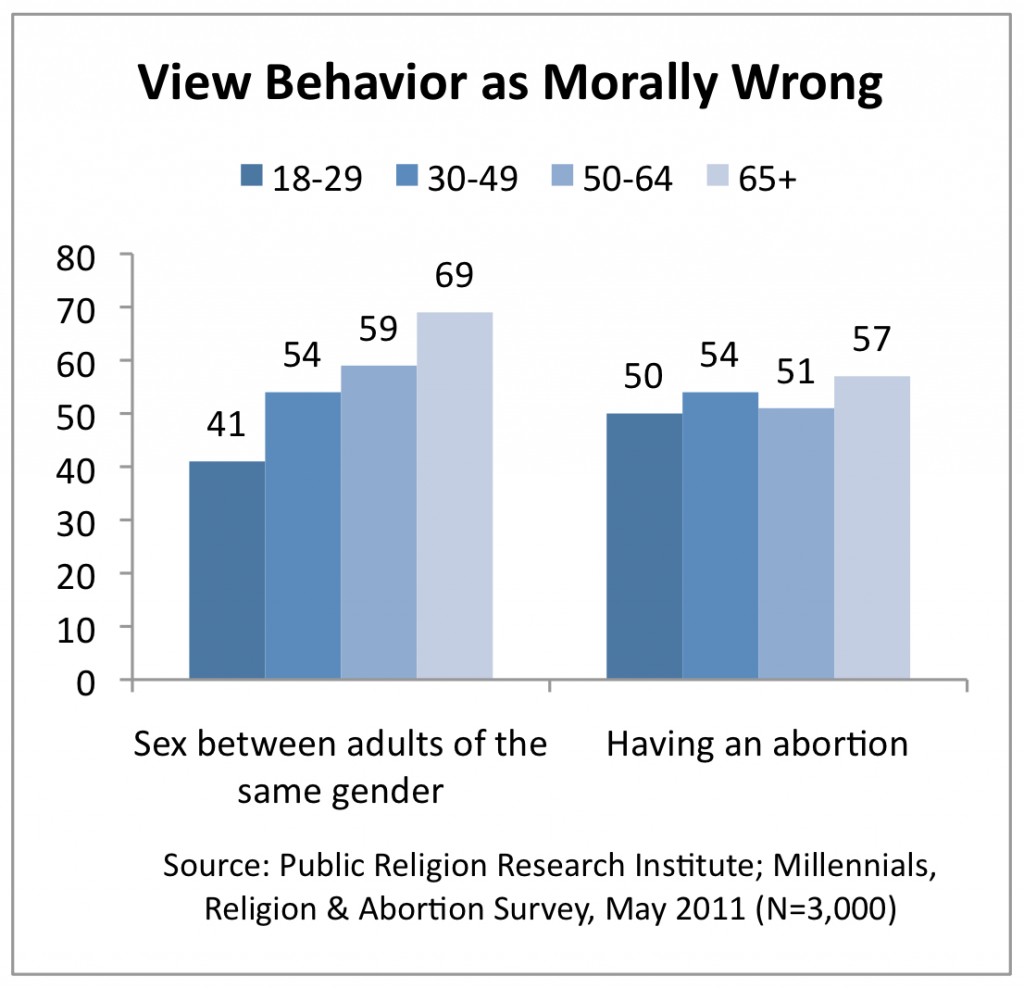 Americans age 65 and older, only about 1-in-4 (26%) say gay couples should be allowed to marry, and another 27% say they should be allowed to form civil unions. Seniors are more than twice as likely as Millennials to say there should be no legal recognition of gay couples’ relationships (44% vs. 21%).
Americans age 65 and older, only about 1-in-4 (26%) say gay couples should be allowed to marry, and another 27% say they should be allowed to form civil unions. Seniors are more than twice as likely as Millennials to say there should be no legal recognition of gay couples’ relationships (44% vs. 21%).
There is also a linear relationship between age and judgments about the moral acceptability of sex between two adults of the same gender, with older Americans much more likely to say these relationships are morally wrong. Among Millennials, 57% say that sexual relations between people of the same gender is morally acceptable, compared to only about 4-in-10 (41%) who say it is morally wrong. In contrast, nearly 6-in-10 (59%) baby-boomers (age 50-64) and nearly 7-in-10 (69%) seniors (age 65 and older) say sexual relations between people of the same gender is morally wrong.
On the other hand, the generational pattern on views about the morality of abortion is non-linear. Millennials are less likely than seniors to say that having an abortion is morally wrong, but the gap is not large (50% vs. 57% respectively). However, there are no significant differences between Millennials and other age groups besides seniors, or between Millennials and the public overall.
Different Top of Mind Associations
Prior to conducting the quantitative survey, we conducted a set of four focus groups among thirty-six white, politically moderate, 18 to 29 year olds in the Harrisburg, Pennsylvania area. The groups, which were separated by gender, were designed to explore the different ways Millennials approached the issues of abortion and same-sex marriage. At the beginning of each group, participants were asked to take part in a “top of mind association” exercise, where they wrote down the first word that came to mind when they heard the term “abortion,” and the first word that came to mind when they heard the term “same-sex marriage.” Participants were then asked to write three other words they associated with each term, which produced a total of 144 associated words for each issue. The table below displays the results of a random selection of 43 words these politically moderate Millennials associated with abortion and same-sex marriage.
As even a cursory glance at the table shows, the Millennials in our focus groups hold dramatically different top of mind associations with abortion and same-sex marriage. On the issue of abortion, a majority (54%) of the words are negative and more associated with opposing legal abortion. For example, the words “death” or “killing” appear five times and “sad” appears three times. Only 16% of the responses are words more associated with affirming legal abortion. In contrast, the top of mind associations with same-sex marriage are strongly affirming. A majority (53%) of the words are positive and more associated with affirming same-sex marriage. The word “equal” appears five times, and the word “love” appears three times. There are also several positive high intensity phrases such as “Awesome,” “It’s cool,” and “Go for it!” Only 21% of the responses are terms more associated with opposing same-sex marriage.
IV. Circumstances, Access, and Restrictions
Views about Abortion in Specific Circumstances
Views on abortion differ markedly depending on the particular circumstances. In order to get a more nuanced picture of how specific circumstances matter for Americans’ views on abortion, we adapted a battery of questions about circumstances from the General Social Survey, one of the longest-running sources of polling on social issues. (3) Strong majorities agree that it should be possible for a woman to obtain a legal abortion in four of seven circumstances: if the woman’s physical health is seriously endangered by the pregnancy (86%); if she became pregnant as a result of rape (79%); if the woman’s mental health is seriously endangered by the pregnancy (74%); and if there is a strong chance of serious defect in the baby (66%).
Americans are more ambivalent or opposed to a woman obtaining a legal abortion in three other specific circumstances. Americans are divided over whether a woman should be able to obtain a legal abortion because the woman is still in high school (47% possible, 49% not possible). Majorities of Americans say it should not be possible for a woman to obtain a legal abortion in two circumstances: the family is low income and cannot afford any more children (52%); and the woman is not married and does not want to marry the man (58%).
The Abortion Circumstances Scale
In order to gain a more nuanced understanding of American views about the permissibility of abortion and specific circumstances, we created an additive scale from 5 of these measures: if the pregnancy was the result of rape (q10d); if there is a strong chance of serious defect in the baby (q10c); if she is still in high school (Q10g); if the family has a low income and cannot afford more children (Q10f); and if the woman is not married and does not want to marry the man (Q10e). (4)
This composite “abortion circumstances scale” improves upon the traditional four-part legality question by painting a more fine-grained portrait of attitudes on abortion. The additive scale produced five categories. Roughly 3-in-10 (29%) Americans say abortion should be possible in all five circumstances, and an additional 14% say abortion should be possible in most circumstances. In contrast, 12% say abortion should not be possible in any of the five circumstances, and an additional 17% say abortion should not be possible in most circumstances.
Importantly, nearly 3-in-10 (28%) Americans are solidly divided and hold mixed views. These respondents either believe abortion should be available in some circumstances and not in others; or were unsure of the circumstances in which abortion should be possible.
This more complex composite measure reveals important differences in opinions of subgroups. Similar to the pattern found in the four-part question, Millennials closely resemble the general public in the number of circumstances in which they say obtaining a legal abortion should be possible, as do Americans who are middle aged. Conversely, Americans who are 65 or older are significantly less likely than the general public to say that it should be possible to obtain a legal abortion in all five circumstances (22% vs. 29% respectively). However, they are not more likely than the public to say abortion should be illegal in all five circumstances (10% and 12% respectively).
There are significant divisions by religious affiliation. Two-thirds (67%) of the religiously unaffiliated and half (50%) of white mainline Protestants say abortion should be possible in most or all circumstances. White Catholics and black Protestants are more divided, but pluralities of each group (44% and 41% respectively) say abortion should be possible in most or all circumstances. Black Protestants are also notable as the group most likely to have mixed views about abortion (36%). In contrast, fewer than 1-in-4 white evangelical Protestants (23%) and Latino Catholics (22%) say abortion should be possible in most or all circumstances. Latino Catholics are half as likely as white Catholics to believe that abortion should be possible in most or all circumstances (22% vs. 44% respectively). It is also noteworthy that at least one-quarter of every major religious group hold mixed views about the circumstances in which abortion should be possible.
Similar to the general question about the legality of abortion, there are also no significant gender differences in attitudes measured by the abortion circumstances scale.
A Brief Look at Americans with Mixed Views on Abortion
Relying on the traditional 4-part measure of abortion often leads to the conclusion that a large majority of Americans are somewhere in the middle on the issue of abortion (either legal in most cases or illegal in most cases). However, in these middle categories there is a variety of opinion. One advantage of constructing a composite scale using multiple measures is that it demonstrates that a much smaller number—approximately 3-in-10 (28%) Americans—constitute the group with solidly mixed views on the permissibility of abortion in certain circumstances.
Perhaps the most remarkable trait about Americans who have mixed views on abortion is that, with the exception of their educational profile, they are nearly indistinguishable from the general public. They are evenly divided between men and women. They reflect proportional numbers of racial and ethnic minorities, and they are also proportionally spread across age categories. A plurality of Americans with mixed views on abortion are politically independent (36%) or moderate (40%), also mirroring the political profile of the public at large. They draw proportionally from major religious groups and attend religious services at roughly the same rates as the general population. Their one distinguishing characteristic is that a majority (52%) of Americans who have mixed views on abortion have a high school education or less, compared to 42% of the general public.
As is expected, Americans with mixed views on abortion are nearly evenly divided on the question of the legality of abortion, with 48% saying abortion should be legal in all or most cases, and 45% saying abortion should be illegal in all or most cases.
Access to and Availability of Local Abortion Services
A slim majority (51%) of Americans say that obtaining an abortion in their community is not too difficult or not at all difficult. One-third (33%) report that it is somewhat or very difficult, and a significant number (17%) report being unsure or did not answer the question. Among Millennials, 55% believe it is not at all or not too difficult to obtain an abortion, and 37% say that it is somewhat or very difficult. Millennials are more likely than other age cohorts to have an opinion about how difficult it is to get an abortion; only 7% report that they are unsure or do not know, compared to 28% of Americans age 65 or older. There are no significant differences in opinion on this question by political or religious affiliation or by gender.
Americans who live in rural areas are about twice as likely as those who live in urban areas to believe that it is either somewhat or very difficult to get an abortion (48% and 25% respectively). A majority (55%) of urban residents say it is not too or not at all difficult. There are no differences in the views of Americans by region; across each region, Americans are much more likely to say it is not that difficult to get an abortion than say it is difficult.
Despite divisions among Americans about the permissibility of abortion across different circumstances, nearly 6-in-10 (58%) Americans agree that at least some health care professionals in their communities should provide legal abortions. However, views differ dramatically by age, religion, education, geography, and community type.
Nearly 7-in-10 (68%) Millennials, but only 42% of seniors age 65 and older, say there should be some legal abortion services available in their community. The views of Americans age 30-49 and 50-64 mirror the views of the general population on this issue.
Majorities of religiously unaffiliated Americans (71%), white mainline Protestants (72%), and black Protestants (56%) say at least some health care professionals in their community should provide legal abortions. Catholics are more divided on this issue overall, but there are double-digit ethnic divisions among Catholics. Nearly 6-in-10 (58%) white Catholics say that at least some health care professionals in their community should provide abortions, compared to only 38% of Latino Catholics. White evangelical Protestant views are very similar to Latino Catholics; only 37% say their communities should have at least some health care professionals who provide abortion services.
Divisions are also large by educational attainment. Approximately three-quarters (76%) of Americans with a post-graduate degree say some health care providers should provide legal abortion services, compared to only 47% of those with a high school education or less.
Americans who live in the Northeast (66%) and West (63%) are significantly more likely than those who live in the Midwest (53%) or South (52%) to say at least some health care professionals should provide legal abortion services. Three-quarters (67%) of Americans who live in large cities believe that at least some health care professionals should provide abortions, compared to only 39% of Americans who live in rural areas.
Restrictions on Abortion: Parental Consent Requirements
Nearly 3-in-4 (73%) Americans favor requiring women under the age of 18 to get the consent of at least one parent before they are allowed to have an abortion. Roughly 1-in-4 (24%) Americans oppose this policy. Support for this policy is strong across demographic, religious, and political groups. Approximately 7-in-10 (71%) Millennials support this requirement, as do nearly two-thirds (64%) of Americans age 65 and older. Support for parental consent laws are also high across the political spectrum, including 64% of Democrats, 74% of Independents, 84% of Republicans, and 85% of those identifying with the Tea Party. Americans who self-identify as politically liberal are the least likely to favor a requirement that women under the age of 18 get parental consent, but even among this group, 54% favor this policy.
Related Issues: Birth Control & Comprehensive Sex Education
Comprehensive sex education in public schools remains popular among a large majority of Americans. Nearly 8-in-10 (78%) Americans favor comprehensive sex education in public schools.
Among generational groups, support for comprehensive sex education is strongest among Millennials (88%), although a solid majority (62%) of seniors age 65 and older also support it. There is also strong support across religious groups. Eighty-five percent of white mainline Protestants, 78% of Catholics, 74% of black Protestants, and 62% of white evangelicals favor teaching comprehensive sex education in public schools.
With the lone exception of the Tea Party, support for comprehensive sex education is also strong across the political spectrum. Two-thirds of Republicans, 79% of independents, and 85% of Democrats support it. A much smaller majority (54%) of Americans who identify with the Tea Party say they favor teaching comprehensive sex education public schools, and 4-in-10 are opposed.
Approximately 8-in-10 (82%) Americans favor expanding access to birth control for women who cannot afford it, compared to only 16% who oppose it. Support is strong across all demographic religious and political groups, including the Tea Party.
V. Overlapping Identities and Attitudes about Abortion Laws
Not Just “Pro-choice” or “Pro-life”
Despite the polarizing rhetoric in the public debate, when given the opportunity, a significant number of Americans identify simultaneously as both “pro-life” and “pro-choice.” For example, 7-in-10 Americans say the term “pro-choice” describes them somewhat (32%) or very (38%) well, and nearly two-thirds of Americans simultaneously say the term “pro-life” describes them somewhat (31%) or very (35%) well.
This overlapping identity is present in virtually every demographic group. For example, while three-quarters of Millennials identify with the term “pro-choice,” 65% also say “pro-life” describes them at least somewhat well; among seniors, nearly two-thirds identify as both pro-choice (65%) and pro-life (66%). With the exception of white evangelical Protestants, solid majorities of every major religious group say both terms describe them at least somewhat well. Eighty percent of white evangelical Protestants say the term “pro-life” describes them at least somewhat well, but still nearly half (48%) also say the term “pro-choice” describes them at least somewhat well. There is also a high degree of overlap among both women and men, with each gender group closely mirroring the general population.
Democrats and Republicans lean in expected directions in identifying with these labels—79% of Republicans and 83% of those identifying with the Tea Party say “pro-life” describes them well, and 81% of Democrats say “pro-choice” describes them well. It is notable, however, that a majority (52%) of Republicans and those identifying with the Tea Party (51%) also say the term “pro-choice” describes them at least somewhat well, and a majority (56%) of Democrats also say the term “pro-life” describes them at least somewhat well.
In order to better understand these overlapping identities, we constructed an additive scale combining the two questions that asked respondents how well the “pro-choice” and “pro-life” labels described them (Q14a and Q14b). (5) This scale helped us sort out the number of Americans who accepted one label but rejected the other even when given the opportunity to identify with both. This analysis produced a roughly normal curve distribution of responses, with a plurality (37%) of Americans holding a mixed identity, either identifying with or rejecting both terms equally. Approximately 1-in-3 Americans identify either as weakly (21%) or strongly (13%) “pro-choice,” while slightly fewer identify as weakly (17%) or strongly (12%) “pro-life.”
This pro-choice/pro-life identity scale produced a higher number of respondents in the mixed category than abortion circumstances scale discussed above. Unlike the mixed category in the abortion circumstances scale, the mixed category in the pro-choice/pro-life identity scale leans strongly towards support for legal abortion. Nearly 6-in-10 (59%) of those in the mixed category say abortion should be legal in all or most cases, compared to only 35% who say it should be illegal in all or most cases.
Social Acceptability of “Pro-Choice” and “Pro-Life” Labels
While Americans are nearly equally divided in identifying with the “pro-choice” and “pro-life” labels, they have a clear opinion of which label is more socially acceptable in contemporary society. A majority (53%) of Americans say that it is more socially acceptable to be “pro-choice” in America today, compared to 32% who say it is more socially acceptable to be pro-life. This pattern generally holds true across most demographic subgroups, including Millennials. Majorities of Democrats (55%) and Republicans (53%), liberals (52%) and conservatives (52%), all say that being “pro-choice” is more socially acceptable today. A plurality (49%) of Catholics agree that the “pro-choice” label is more acceptable, but 39% of Catholics—higher than any other religious group—say that the “pro-life” label is more socially acceptable. This difference among Catholics is largely due to the differences between white Catholics, among whom a solid majority (57%) say the “pro-choice” label is more socially acceptable, and Latino Catholics, among whom a solid majority (61%) say the “pro-life” label is more socially acceptable. There are no significant differences in views on this question by region or community type.
Americans who believe abortion should be legal in all cases are not any more likely than the general public to believe that being “pro-choice” is more socially acceptable (52%). On the other hand, Americans who say abortion should be illegal in all cases are more likely than the general public to say being “pro-life” is more socially acceptable (43%), although approximately the same number say being “pro-choice” is more socially acceptable (45%).
Overlapping Support for Different Purposes of Abortion Laws
Reflecting their complex pro-choice/pro-life identities, many Americans simultaneously affirm seemingly contradictory statements about the purpose of abortion laws. Strong majorities, for example, simultaneously say that it is appropriate for abortion laws to protect the life of the fetus throughout the entire pregnancy, and that it is appropriate for laws to preserve a woman’s freedom to make her own decisions (63% to 70%). Roughly 8-in-10 also say it is appropriate for abortion laws to protect the health and well-being of women, and that it is appropriate for laws to encourage women to make more responsible decisions (82% and 78% respectively).
VI. Complexities: Morality and Sin vs. Legality and Availability
When making judgments about the issue of abortion, Americans draw distinctions between what is moral, what is sinful, and what is responsible. A slim majority say having an abortion is morally wrong. On the other hand, Americans are divided on whether abortion is sinful, and a solid majority of Americans say that in some circumstances having an abortion is the most responsible decision a woman can make.
Situational vs. Principle-based Approaches to Morality
At a macro level, most Americans favor a more situational morality that factors in circumstances rather than a principle-based approach that relies on absolute rules that always apply. A majority (54%) of Americans believe what is right or wrong almost always depends on the situation, compared to 43% who believe that there are some things that are just wrong.
This moral orientation divides Americans by gender, age, religion, and political affiliation. Women are more likely than men to embrace a situational approach to morality (58% vs. 51%). Millennials are significantly more likely to be situationalists than seniors (64% vs. 56%). Solid majorities of every major religious group, except white evangelical Protestants, also lean towards a situationalist approach. In contrast, 54% of white evangelical Protestants embrace a principle-based approach to morality. This basic moral orientation also distinguishes Republicans and those identifying with the Tea Party, among whom majorities take a principle-based approach (53% and 56% respectively), from Democrats and Independents, among whom majorities take a situationalist approach (61% and 55% respectively).
Morality
Views about the morality of certain personal behaviors range from judgments about divorce, which is broadly viewed as morally acceptable, to judgments about sex between young people under the age of 18, which is widely viewed as morally wrong. The issue of abortion ranked roughly in the middle of five behaviors Americans believe are morally acceptable or wrong.
The Moral Acceptability of Abortion in Context
A slim majority (52%) of Americans believe having an abortion is morally wrong, compared to 40% who say it is morally acceptable. Millennials are more divided on the morality of abortion, with half (50%) saying having an abortion is morally wrong and 46% saying it is morally acceptable. Among Americans age 65 and older, 57% say abortion is morally wrong, and 31% say it is morally acceptable. There are no significant gender differences in attitudes about the moral acceptability of abortion.
Majorities of most major religious groups—including white evangelical Protestants (75%), African American Protestants (60%), and Catholics (58%)—believe that having an abortion is morally wrong. White Mainline Protestants stand out here, with roughly equal numbers saying having an abortion is morally acceptable (45%) or morally wrong (43%). A strong majority (61%) of religiously unaffiliated Americans believe having an abortion is morally acceptable. More than two-thirds of Republicans and 7-in-10 members of the Tea Party movement say abortion is morally wrong, compared to only 42% of Democrats.
Americans’ basic moral orientation—situational vs. principle-based—influences their views on this question. Not surprisingly, among those who hold a principle-based approach to morality, 63% believe having an abortion is morally wrong. Among those who hold a more situationalist approach to morality, a plurality (48%) say having an abortion is morally acceptable, compared to 43% who say it is morally wrong.
The Moral Acceptability of Other Issues
Two-thirds of Americans say that getting divorced is morally acceptable. Fewer than 3-in-10 (27%) say it is morally wrong. A strong majority of white mainline Protestants (73%), Catholics (68%), and the unaffiliated (77%) say getting divorced is morally acceptable. A smaller majority of black Protestants (54%) and a plurality (49%) of white evangelicals believe divorce is morally acceptable. There is little difference between Millennials and older age cohorts on the issue of divorce.
Nearly 6-in-10 (57%) Americans say that sex between an unmarried man and woman is morally acceptable. The gap between Millennials and older Americans is substantial on this question. Seven-in-ten Millennials say that sex between an unmarried man and woman is morally acceptable, compared to just 38% of Americans age 65 and older.
About 4-in-10 (41%) Americans say that sex between two adults of the same gender is morally acceptable; a majority (55%) say it is morally wrong. There is a thirty-point generation gap on this question. Among Millennials, nearly 6-in-10 (57%) say sex between two adults of the same gender is morally acceptable, compared to only 1-in-4 (25%) Americans age 65 and older.
Only about one-third (34%) of Americans say that sex between a young man and woman under the age of 18 is morally acceptable. Roughly six-in-ten (61%) say it is morally wrong. Millennials are more likely than older Americans to say that sex among young people under the age of 18 is morally acceptable, but even among this age cohort less than half agree that it is (45%).
Sin
Americans are more likely to say that having an abortion is morally wrong than they are to say that it is a sin. On the theological question, Americans are divided: 46% believe having an abortion is a sin, and 44% disagree. There are few generational differences on this question. Millennials’ views roughly resemble those of the general population: 45% believe having an abortion is a sin, but a plurality (49%) disagree.
There are significant religious and political divisions on this question. Nearly 7-in-10 (69%) white evangelicals, and nearly two-thirds of black Protestants (64%) and Latino Catholics (65%), agree that having an abortion is a sin. White Catholics are evenly divided, with 46% agreeing that having an abortion is a sin, and 46% disagreeing. White mainline Protestants are the only major religious group in which a majority (55%) does not believe that having an abortion is a sin.
There are also significant gender and political differences. Women are somewhat more likely than men to say that having an abortion is a sin (50% vs. 43%), which may reflect the fact that women generally have higher levels of religious engagement than men. More than 6-in-10 Republicans and Americans who identify with the Tea Party movement (61% and 62% respectively) believe that having an abortion is a sin, compared to only 39% of Democrats and 43% of political independents.
Responsibility
Despite holding significant moral and theological concerns, nearly 6-in-10 (59%) Americans believe that in certain circumstances having an abortion is the most responsible decision a woman can make. Approximately one-third (35%) reject this statement and say that having an abortion is a selfish decision that allows a woman to avoid taking responsibility. Millennials are no more likely than older Americans to say that abortion can be the most responsible decision a woman can make.
With the exception of white evangelical Protestants and Latino Catholics, strong majorities of all major religious groups—including 68% of white mainline Protestants, 60% of black Protestants, and 63% of white Catholics—say that in certain circumstances having an abortion is the most responsible decision a woman can make. In contrast, only 38% of white evangelical Protestants and 44% of Latino Catholics agree. A majority (56%) of white evangelicals and a plurality (47%) of Latino Catholics say that having an abortion is a selfish decision that allows a woman to avoid taking responsibility.
Notably, more than one-third those who believe having an abortion is morally wrong (36%) or having an abortion is a sin (35%) also nonetheless believe having an abortion is in some circumstances the most responsible decision a woman can make. Among Americans who take a more situationalist approach to morality, two-thirds (67%) say having an abortion is in some circumstances the most responsible decision a woman can make. Even among Americans who take a more principle-based approach to morality, half (50%) say it is in some cases the most responsible decision a woman can make.
The Big Picture: Americans Conflicted on Morality and Theology, Committed to Legality and Availability
Americans’ moral and religious judgments have a complex relationship to support for the legality of abortion and the availability of legal abortions in local communities.
While Americans are morally opposed and theologically conflicted about the issue of abortion, they are simultaneously committed to the legality of abortion and to the availability of abortion in their local community. It is notable that there is a nearly 20-point gap between the minority of Americans who say abortion is morally acceptable and the strong majority of Americans who nonetheless say that at least some health care professionals should provide legal abortions in their local communities.
The Legality/Availability Difference among Millennials
The table above also reveals an important and unique attribute of Millennials. In the general population and all other age groups except for Millennials, nearly equal numbers support the legality of abortion and the local availability of abortion services. Millennials, however, support the availability of local abortion services at a significantly higher rate (68%) than they support the legality of abortion (60%).
In order to sort out the independent effect of age on views of the legality and availability of abortion, we constructed two different multivariate regression models. (6) The first model included basic demographic, religious, and political variables to predict being a member of the group who says abortion should be illegal in all or most cases. The second model included the same controls to predict being a member of the group who says at least some health care professionals in their local community should provide legal abortions.
On the question of legality, when controlling for other characteristics, Millennials are surprisingly 1.3 times more likely than older Americans to say abortion should be illegal in all or most cases. In contrast, on the question of availability, when controlling for the same other characteristics, Millennials are about 1.5 times more likely than older Americans to say at least some health care providers should provide legal abortions in their community.
The analysis suggests that Millennials respond in a somewhat idiosyncratic way to questions about legality or public policy, registering opinions that are less supportive than might otherwise be predicted given their overall profile. More concrete questions about the availability of abortion in their local community elicit significantly higher support. In other words, these findings suggest general measures of legality may not fully capture support for legal abortion among Millennials.
The Legality/Availability Difference among Religious Groups
Comparing the differences between moral and theological evaluations on the one hand, and opinions about legality and availability on the other hand also reveals important religious differences. There are also double-digit gaps between the proportion of religious Americans who say abortion is morally or theologically acceptable and the proportion who say abortion should be legal or locally available.
The largest gaps between moral acceptability and local availability are among white mainline Protestants and black Protestants, where the gap is approximately 27 and 25 points respectively. Only 45% of white Mainline Protestants believe having an abortion is morally acceptable, but 72% say at least some health care professionals in their community should provide legal abortion services. Similarly, only 31% of black Protestants believe having an abortion is morally acceptable, but 56% say legal abortion services should be available in their community.
One distinctive pattern worth noting is the difference between attitudes among white religious groups and minority religious groups across these four measures. Among all white religious groups, support for local availability is higher than support for legality. Among minority religious groups and minorities overall, support for legality exceeds support for local availability. For example, nearly two-thirds of black Protestants (66%) and a slim majority (51%) of Latino Catholics say abortion should be legal in all or most cases. However, a smaller majority (56%) of black Protestants and only 38% of Latino Catholics say at least some health care professionals should provide legal abortions in their local communities.
VII. Religious Institutions, Clergy, and Abortion
Religious Attendance
Americans who attend religious services at least weekly are more likely to oppose the legality of abortion than those who attend less frequently or who never attend religious services. Among the approximately 4-in-10 Americans who attend religious services at least once a week, 60% say abortion should be illegal in all or most cases, compared to 36% who say it should be legal in all or most cases. In contrast, nearly two-thirds (64%) of Americans who attend services less frequently (monthly or a few times a year), and nearly three-fourths (74%) of Americans who attend services seldom or never, say abortion should be legal in all or most cases. This general pattern holds among Millennials and all other age groups.
Church attendance patterns do not influence opinions on abortion equally in all religious groups. Most importantly, frequency of attendance matters more for Catholics than it does for other major religious groups. Among Catholics, 41% attend church at least weekly, 38% attend church monthly or a few times a year, and 19% say they seldom or never attend. Among the approximately 4-in-10 Catholics who attend church at least weekly, only about one-third (34%) say abortion should be legal in all or most cases. But strong majorities of Catholics who attend monthly or a few times a year (62%) or who attend seldom or never (78%) say abortion should be legal in all or most cases.
Religious affiliation appears to matter more among some religious groups than others. Majorities of white evangelical Protestants in all measurable religious attendance categories say abortion should be illegal in all or most cases. Conversely, majorities of white mainline Protestants and black Protestants in all religious attendance categories say abortion should be legal in all or most cases.
Frequency of church attendance also influences Americans’ views about the availability of abortion services in their neighborhoods. Among those who attend religious services at least once a week, a slim majority (52%) disagree that there should be at least some health care professionals in their communities who provide legal abortions, but 42% of this group say these services should be available. Strong majorities of Americans who attend religious services monthly or a few times a year (63%) and those who attend seldom or never (74%) say at least some health care professional in their communities should provide legal abortions. These attendance patterns generally hold up within religious groups with two exceptions: majorities of even the most frequently attending white Mainline Protestants (62%) and black Protestants (52%) say at least some health care professionals should provide legal abortions in their communities.
Biblical Literalism
Certain theological views are also linked to views about abortion. Americans who say the Bible is the word of God and should be taken literally, word for word, are more likely to believe abortion should be illegal. Among this group, roughly 6-in-10 (59%) say abortion should be illegal in all or most cases and less than 4-in-10 (37%) say it should be legal in all or most cases. A majority (53%) of Americans who say the Bible is the literal word of God, but that not everything in it should be taken literally believe abortion should be legal. Among Americans who believe that the Bible is a book written by men and not the word of God, more than 8-in-10 believe abortion should be legal in all (34%) or most (49%) cases. These patterns generally hold across religious groups.
Hearing about Abortion and Homosexuality in Church
Among Americans who attend church at least once or twice a month, majorities report hearing their clergy talk about the issue of abortion (54%) and homosexuality (51%) in church. There are dramatic differences, however, in this pattern among religious subgroups.
Regularly attending Catholics are significantly more likely than regular churchgoers overall to hear about the issue of abortion. More than 7-in-10 (72%) white Catholics who attend worship at least once or twice a month say their clergy talk about the issue of abortion, while only about one-third (35%) say they hear about the issue of homosexuality. The gap among regularly attending Latino Catholics is somewhat smaller, but they are still more likely to hear about the issue of abortion (63%) than homosexuality (49%).
There is a less pronounced emphasis gap among Protestants. Among white evangelicals, 57% report hearing about the issue of homosexuality, while 54% say they hear about abortion from their clergy. More than 6-in-10 (61%) black Protestants say their clergy speak out on the issue of homosexuality, while a smaller majority (52%) hear about abortion. White mainline Protestants are significantly less likely than any other religious group to hear their clergy talk about either issue; only about 4-in-10 report hearing about homosexuality (43%) or abortion (39%) in their churches.
Americans who regularly attend religious services and hear their clergy speak about the issue of abortion or homosexuality report hearing that these issues are morally wrong. Among Americans who hear their clergy speak about abortion in church, 81% hear it is morally wrong, compared to just 3% who hear it is morally acceptable. Similarly, among Americans who hear their clergy speak about the issue of homosexuality in church, nearly 8-in-10 (77%) hear that it is morally wrong, compared to only 5% who hear that it is morally acceptable.
White mainline Protestants and white Catholics hear significantly different emphases from their clergy on these two issues. Three-quarters (75%) of white mainline Protestants hear from their clergy that abortion is morally wrong, compared to just 54% who report hearing their clergy say homosexuality is morally wrong. Among white Catholics, 86% report hearing their clergy say that abortion is morally wrong, compared to 64% who hear this same negative message about the issue of homosexuality. There are no significant differences in clergy messages on these two issues among white evangelicals, Latino Catholics, or black Protestants.
The messages Americans are hearing in church are strongly correlated with their views on the issues of abortion. Among Americans whose clergy say abortion is morally wrong, approximately two-thirds (66%) believe abortion should be illegal in all or most cases. In contrast, less than half of those who do not hear about the issue from their clergy, or whose clergy do not take a clear position on the issue, believe abortion should be illegal in all or most cases (42% and 45% respectively).
Disagreement with Official Religious Teachings
Strong majorities of Americans believe it is possible to disagree with the teachings of their religion on the issue of abortion (72%) or homosexuality (63%) and still be considered a person of good standing in their faith. Protestants generally say there is more room for disagreement on the issue of abortion, while Catholics say there is more room for disagreement on the issue of homosexuality.
White mainline Protestants are more likely than any other major religious group to believe that they can still be a good Christian even if they disagree with the teachings of their religion on the issue of abortion (86%) or homosexuality (77%). More than two-thirds (67%) of white evangelicals say that it is possible to disagree with their religion’s teachings on abortion and still be considered a good Christian, but they are the only religious group in which less than a majority (47%) agree that it is possible to be a good Christian if one disagrees with their religion’s teachings on homosexuality. Catholics are about as likely as other religious groups to say you can still be a good Catholic even if you disagree with official church teachings on abortion (68%), and they are significantly more likely than the general population to say the same about the issue of homosexuality (74%).
Rating Places of Worship on their Handling of Abortion & Homosexuality
Among Americans who identify with a religious faith, a majority overall give their places of worship high marks (either an ‘A’ or ‘B’) on how they handle the issues of abortion (58%) and homosexuality (55%). White evangelicals are most likely to give their churches high marks for how they are handling the issue of abortion (68%) and homosexuality (67%). Majorities of black Protestants also give their churches high marks for handling abortion (52%) and homosexuality (54%).
On the other hand, less than half of white mainline Protestants and Catholics give their places of worship high marks on either issue. Forty-nine percent of white mainline Protestants give their churches high marks on their handling of abortion, and nearly identical numbers give their churches high marks on their handling of homosexuality (48%). Among Catholics, 49% give high marks to their churches for how they handle the issue of abortion, but only 42% give their churches high marks for handling the issue of homosexuality. Catholics are more likely than other religious groups to give their churches low marks for handling both issues. About 1-in-4 Catholics give their places of worship low marks (either a ‘D’ or ‘F’) for their handling of both the issue of abortion (24%) and the issue of homosexuality (26%).
Among Catholics, 44% say the position of the Catholic Church on the issue of abortion is too conservative, 45% say the position of Catholic Church on the issue of abortion is about right, and just 7% say it is too liberal. Among Catholics who attend worship services at least once a week, less than one-third (31%) say the Church’s position is too conservative, while nearly 6-in-10 (59%) say it is about right. Catholics who say the position of Catholic Church on the issue of abortion is too conservative are more likely to give the Church poor marks for how it is handling the issue of abortion than Catholics overall (37% to 24% respectively).
Religious Leaders and Politicians
More than 6-in-10 (61%) Americans say that it is wrong for religious leaders to attempt to publicly pressure politicians on the issue of abortion, compared to 35% who say that it is right for religious leaders to do this. Two-thirds of white mainline Protestants (67%) and nearly 6-in-10 Catholics (58%) and black Protestants (58%) say it is wrong for religious leaders to publicly pressure politicians on the issue of abortion. Even among more politically conservative constituencies, such as Republicans (48%), Americans who identify with the Tea Party movement (49%), and white evangelical Protestants (49%), less than half say that it is right for religious leaders to attempt to publicly pressure politicians on the issue of abortion. There are no significant differences on this question by age, education, or gender.
VIII. Influences on Views about Abortion
There are a number of factors that influence attitudes about abortion. Demographic factors like education, income, age, and race; religious factors like evangelical religious affiliation, frequency of attendance, and views of the Bible; and political characteristics like party affiliation and political ideology each are significant independent predictors of views about abortion. In addition to these well-known factors, we tested six new factors as predictors of views on the legality of abortion: holding a situationalist approach to morality; having empathetic traits; knowing someone who has had an abortion; knowing someone who has a special needs child; seeing recently an ultrasound of a fetus; or watching television programs featuring young unmarried women who are pregnant or who have young children. (7)
Situationalist Approach to Morality
Americans who embrace a more situationalist ethic are much more likely to support legalized abortion than those who favor a more principle-based approach to moral issues. Among Americans who embrace a situationalist ethic, nearly two-thirds (64%) say abortion should be legal in all or most cases. In contrast, among Americans who embrace a principle-based approach to morality, a plurality (49%) say abortion should be illegal in all or most cases, and only 46% say abortion should be legal in all or most cases.
Empathy and Social Relationships
The survey contained four measures of self-reported openness to the perspectives and experiences of others, along with measures of actual relationships, in order to sort out how much a general orientation towards empathy and concrete social relationships influence views on abortion. We were particularly interested in this attribute to test a hypothesis that Millennials, with the age of the internet and their diverse friendship networks, might score higher on these attributes, and that they might be related to views on abortion.
Empathy
Across the battery of questions related to empathy, there were few differences between Millennials and the general population.
In the general population, self-descriptions of empathetic traits turn out to be a poor predictor of views on abortion. Americans who describe themselves as being very open to other points of view and willing to try to understand the circumstances of other people initially appear to be more likely to support legal abortion than those who do not. However, these differences do not hold up as independent influences when we control for other factors.
Knowing Someone Who has had an Abortion
Knowing someone who has had an abortion, however, has a strong influence on views about abortion. More than 6-in-10 (61%) Americans say that they know someone who has had an abortion, compared to 38% who say they do not. With the exception of seniors, there are no large differences between age groups; only 42% of seniors report knowing someone who has had an abortion.
Among those who know someone who has had an abortion, roughly two-thirds (64%) say this is someone in their own generation. About 1-in-5 (22%) say it is someone in another generation, and 13% say they know someone in both their own and another generation who has had an abortion.
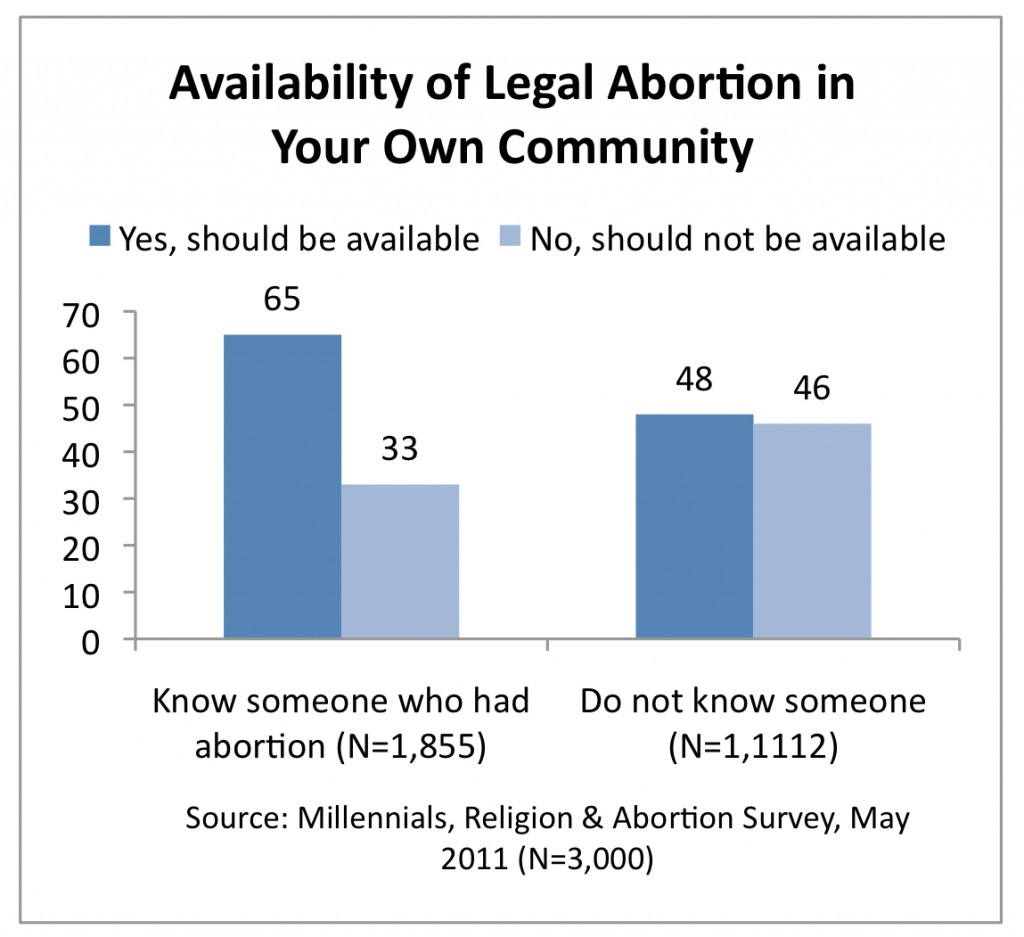 There are significant differences in support for the legality of abortion between those who do and do not know someone who has had an abortion. Among Americans who say they know someone who has had an abortion, about 6-in-10 (61%) say it should be legal in all or most cases. Among those who do not know someone, less than half (49%) say abortion should be legal in all or most cases.
There are significant differences in support for the legality of abortion between those who do and do not know someone who has had an abortion. Among Americans who say they know someone who has had an abortion, about 6-in-10 (61%) say it should be legal in all or most cases. Among those who do not know someone, less than half (49%) say abortion should be legal in all or most cases.
The experience of knowing someone who has had an abortion also has a strong influence on views about the availability of legal abortion in local communities. Nearly two thirds (65%) of those who know someone who has had an abortion say at least some health care professionals in their local communities should provide legal abortions, compared to only 48% of those who do not know someone who has had an abortion.
Knowing Someone with a Special Needs Child
There is no relationship between those who know someone with a disabled or special needs child and views on the legality of abortion. Knowing someone with a disabled or special needs child also has no impact on views about whether it should be possible for a woman to obtain an abortion if there is a strong chance of serious defect in the baby.
Ultrasound Images
Nearly 6-in-10 (58%) Americans say they have recently seen an ultrasound image, either over email, in a printout or on Facebook. Younger Americans are significantly more likely than older Americans to report seeing an ultrasound. Nearly two-thirds (64%) of Millennials and 69% of Americans age 30-49 say they have recently seen an ultrasound, compared to only 35% of Americans age 65+.
When no other variables are controlled for, Americans who have recently seen an ultrasound image do not differ from the general public in their views about the legality of abortion. Like the general population, 56% of those who have seen an ultrasound image say abortion should be legal in all or most cases. However, when we applied other demographic controls in order to understand the isolated effect of seeing an ultrasound image, we find a modest but significant negative impact on support for legal abortion. In other words, Americans who have recently seen an ultrasound are less likely to say abortion should be legal in all or most cases than those who have not.
Movies and Television
Movies and television shows about young pregnant women or young unwed mothers have a modest but significant impact on views about the legality and morality of abortion. Overall, younger Americans are far more likely than older Americans to report having seen a television show or a movie about this topic. Among Millennials, more than 7-in-10 (71%) report having seen a movie or TV show about teenage pregnancy. Among seniors age 65 and up, fewer than one-third (31%) report having seen movies or shows that feature these themes. Roughly 1-in-5 (17%) Americans, including nearly 3-in-10 (29%) Millennials, report having seen one of MTV’s two popular reality shows on this topic: “16 and Pregnant” or “Teen Mom.”
Americans who have seen MTV’s shows “Teen Mom” or “16 and Pregnant” are significantly more likely than the general public to say that abortion should be legal in all or most cases (65% vs. 56% of the public) and to say that having an abortion is morally acceptable (48% vs. 40% of the public). They are also nearly twice as likely as those who have not seen these shows to say that at least some health care professionals in their communities should provide legal abortions (65% vs. 34% respectively).
Myths and Facts about Influences on Abortion
The analysis above allows us to sort out factors that are independent predictors of attitudes on abortion. Of the six factors tested, four have a significant effect and two are not significant. Among the significant factors, three have a positive significant effect on support for abortion being legal in all or most cases: holding a situationalist view of morality; knowing someone who has had an abortion; and having seen either of MTV’s two reality shows featuring young unmarried women who are pregnant or who have young children. One item has a negative significant effect on support for abortion being legal in all or most cases: recently seeing an ultrasound image of a fetus. Finally, two items had no significant effect: self-identifying as being empathetic and knowing someone with a special needs child.
Endnotes
1 Throughout this report, urban/rural breakdowns reflect results from the landline sample only because community type was unavailable for respondents reached by cell phone.
2 The current survey uses a 3-part question that asks about support for allowing gay and lesbian couples to marry, for allowing gay and lesbian couples to form civil unions but not marry, and for no legal recognition of a gay couple’s relationship. This 3-part question, because of an explicit option for civil unions, results in slightly lower support for same-sex marriage than the 2-part question used by Gallup.
3 The General Social Survey (GSS) is conducted by the National Opinion Research Center at the University of Chicago. Since 1972, the GSS has been monitoring societal change and the growing complexity of American society. Except for the U.S. Census, the GSS is the most frequently analyzed source of information in the social sciences. For this study, we omitted some items, and added the item, “if she is still in high school.” The question stem and other items were taken verbatim from the GSS.
4 Two measures were excluded from this analysis because they were only asked of half the total sample: Q10a, which asked whether abortion should be possible if the woman’s physical health was endangered, and Q10b, which asked if abortion should be possible if the woman’s mental health was endangered.
5 Strong identifiers are those respondents who both strongly identify with one label and strongly reject the other. Weak identifiers have one of two attributes: 1) they do not strongly identify with one label but strongly reject the other; or 2) they strongly identify with one label but do not strongly reject the other. Mixed identifiers are those who refuse to identify with either label, or those who identify with or reject both labels equally.
6 The logistic regression models (not shown) included the following independent variables: party affiliation, education, political ideology, education, gender, age, religious attendance, income, race and ethnicity, evangelical self-identification, and views about the inerrancy of the Bible.
7 The logistic regression model (not shown) predicting support for legal abortion in all or most cases included the following basic demographic, political and religious covariates: party affiliation, education, gender, age, political ideology, religious attendance, income, race and ethnicity, evangelical self-identification, and views about the inerrancy of the Bible. The model also included the following additional variables to indicate respondents who know someone who had an abortion (Friendship Effect), a belief that things that are right or wrong depend on the situation (Situationalist Morality Effect), knowing someone with a special needs child (Special Needs Children Effect), and self-identifying as being more empathetic or open to the views of others (Empathy Effect). In addition to this model, two separate models were run that included a variable to indicate having seen one of MTV’s reality shows (the MTV Effect), and a variable for those who had recently seen an ultrasound. These two additional models were necessary because these questions were each asked of only half of the sample and thus had to be run independently of each other.
Recommended citation:
Jones, Robert P., Daniel Cox, and Rachel Laser. “Committed to Availability, Conflicted about Morality: What the Millennial Generation Tells Us about the Future of the Abortion Debate and the Culture Wars.” PRRI. 2011. http://www.prri.org/research/committed-to-availability-conflicted-about-morality-what-the-millennial-generation-tells-us-about-the-future-of-the-abortion-debate-and-the-culture-wars/.
